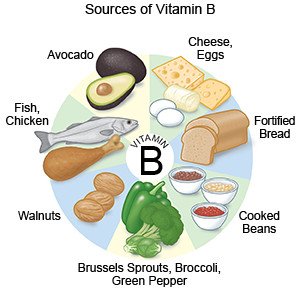Vitamin B12 Deficiency
Medically reviewed by Drugs.com. Last updated on Aug 4, 2025.
AMBULATORY CARE:
Vitamin B12 deficiency
is a low level of vitamin B12 in your body. Vitamin B12 is only found in foods that come from animal sources such as fish, beef, dairy products, and eggs. Vitamin B12 deficiency should be treated as early as possible. Without treatment, it can cause permanent nerve damage over time.
Common symptoms include the following:
- Fatigue or weakness
- Loss of appetite or weight loss
- Constipation
- Depression, confusion, dementia, or poor memory
- Mouth or tongue soreness
- Trouble keeping your balance
- Numbness or tingling in your hands or feet
- In infants and children, irritability, poor growth, developmental delay, or movement disorders
Call your doctor or dietitian if:
- You continue to have symptoms, or your symptoms get worse.
- You have questions or concerns about your condition or care.
Treatment for vitamin B12 deficiency
may include any of the following:
- For low intake deficiency , you may need to eat more foods that contain or are fortified with vitamin B12. You may also need to take an over-the-counter supplement.
- For low absorption deficiency , you may need several high doses of vitamin B12 to increase your levels. These doses of vitamin B12 may be given as a shot or pill. You may need to take these vitamin B12 supplements for the rest of your life.
Good sources of vitamin B12:
 |
- 3 ounces of cooked clams, 84.1 mcg
- 3 ounces of cooked beef liver, 70.7 mcg
- Fortified breakfast cereals, 1.5 to 6 mcg per serving
- 3 ounces of salmon, rainbow trout, or canned tuna fish, 2.5 to 4.8 mcg
- 3 ounces of top sirloin beef, 1.4 mcg
- 1 cup of milk or yogurt, 1.1 to 1.2 mcg
- 1 cup of a soy milk product, 0.9 to 3.3 mcg
- 1 ounce of a meat substitute, 0.5 to 1.2 mcg
- 1 ounce Swiss cheese, 0.9 mcg
- 1 large egg, 0.6 mcg
Treatment options
The following list of medications are related to or used in the treatment of this condition.
Amount of vitamin B12 you need each day:
- Infants 0 to 12 months: 0.4 micrograms (mcg) to 0.5 mcg
- Children 1 to 3 years: 0.9 mcg
- Children 4 to 8 years: 1.2 mcg
- Children 9 to 13 years: 1.8 mcg
- Children over 14 years and adults: 1.8 mcg
- Pregnant women and adolescents (over 14 years): 2.6 mcg
- Breastfeeding women and adolescents (over 14 years): 2.8 mcg
Follow up with your doctor or dietitian as directed:
Write down your questions so you remember to ask them during your visits.
© Copyright Merative 2025 Information is for End User's use only and may not be sold, redistributed or otherwise used for commercial purposes.
The above information is an educational aid only. It is not intended as medical advice for individual conditions or treatments. Talk to your doctor, nurse or pharmacist before following any medical regimen to see if it is safe and effective for you.
Learn more about Vitamin B12 Deficiency
Treatment options
- Medications for Anemia Associated with Vitamin B12 Deficiency
- Medications for Folic Acid/Cyanocobalamin Deficiency
- Medications for Vitamin B12 Deficiency
Care guides
Symptoms and treatments
Further information
Always consult your healthcare provider to ensure the information displayed on this page applies to your personal circumstances.
